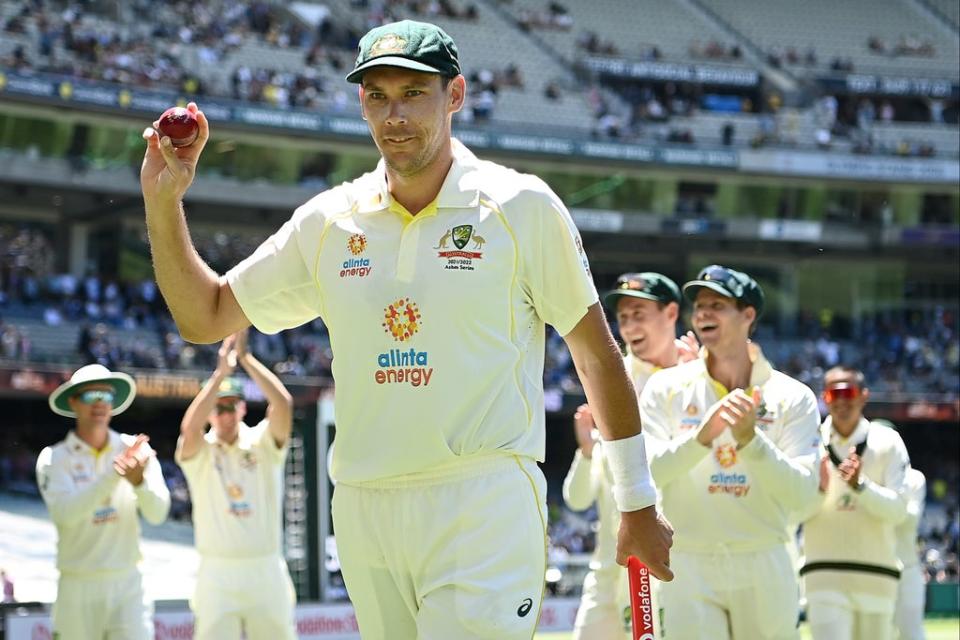Ashes diary: Historically bad batting, Boland’s medal and naughty boy nets
The Ashes are staying in Australia after the home side took an insurmountable 3-0 series lead over England with victory in the Third Test at the Melbourne Cricket Ground.
An innings defeat represented the worst humiliation yet for an England side who were bowled out for just 68 before lunch on the third day.
Here’s our cricket correspondent Will Macpherson with his latest Ashes diary…
Historically bad
There are two stats that highlight quite how awful England’s batting has been this year.
First, the ducks. Five more in Melbourne sees them conclude 2021 with 54 in Test cricket, equalling their own record set in 1998. A staggering 20 different players made a duck for them this year. Here’s the full, final breakdown:
England's final, record-equalling tally of 54 ducks:
- 6 Burns
- 5 Robinson
- 4 Hameed, Lawrence, Sibley, Bairstow, Anderson
- 3 Broad, SCurran
- 2 Buttler, Crawley, Archer, Bracey
- 1 Root, Malan, Leach, Stone, Wood, Moeen, Bess
- 0 Pope Stokes, Woakes, Foakes, Overton— Will Macpherson (@willis_macp) December 28, 2021
The other is their awful over-reliance on captain Joe Root. He finished third on the all-time list for Test runs in a year, on 1,708, two behind Viv Richards (1976) and 80 behind Mohammad Yousuf’s epic 2006.
It was fitting that he top-scored in both innings in Melbourne. Here’s some quick fire stats on his dominance:
England’s next highest run scorer this year was Rory Burns, with just 530 from 10 matches, with extras (412) slotting into third place.
Root made more runs than England’s next four highest runscorers combined.
Root scored 26% of England’s runs in 2021, the highest percentage of a team’s score (with a qualifying figure of 1,000 runs).
Incredibly, by February 6, three centuries and three wins in, he had already scored more runs than any of his team-mates would manage all year.
In the course of the year, he moved from 31st to 14th in the list of all-time men’s runscorers.
If only he had some support, eh.
The cap fits
Could there have been a more fitting winner of the second Johnny Mullagh Medal than hometown hero Scott Boland?
The Mullagh Medal was inaugurated last year and goes to the Player of the Match in the Boxing Day Test. The first winner was Ajinkya Rahane, captain of India in a stunning win. Mullagh led the Aboriginal XI who visited England in 1868, the first Australian sports team to tour internationally.
This time it was Boland, the debutant who became just the second Indigenous Australian – after Jason Gillespie – to play men’s Test cricket. He finished with an average of 7.68, best bowling figures of six wickets for seven runs (Test cricket’s joint second cheapest six-for), and a stump to celebrate. Not bad for a 32-year-old journeyman who probably thought his hopes of playing Test cricket had passed.
Boland travelled to England in 2018 as part of a group retracing the footsteps of Mullagh and his team. Three years on, Belinda Duarte, a descendant of the 1868 Aboriginal XI, presented a clearly emotional Boland with the award.

Naughty boy nets
Before play on day three, the dropped England opener Rory Burns and batting coach Graham Thorpe were engaged in a tense, animated chat on the outfield at the MCG.
When the Test match was lost, the pair were in the nets – which are very much open to the public – working on his technique.
That will not be England’s last net session. Covid results pending, a group of England players will be back in the nets, which is most unusual after the day after a game concludes when the only balls being hit tend to be small dimpled white ones.
Putting on a show
England lost so quickly on the third day at the MCG, that spectators remained in the ground – whether in public bars or corporate boxes – for many hours afterwards enjoying a beautiful Melbourne day.
At around 2.30, they were treated to some cricket on the outfield, when most of the Australian squad emerged with their young children to play. Usman Khawaja bowled to David Warner’s young daughters, who strike the ball so well and have such an appetite for the game it would be a surprise if at least one of them does not end up playing for Australia. England’s Women’s Ashes team of 2035 has been warned.


